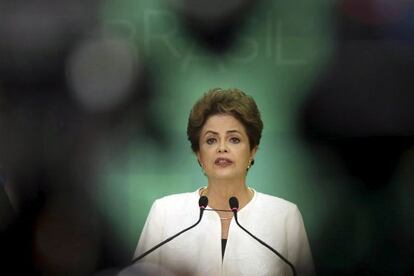Brazilian President Dilma Rousseff faces impeachment proceedings
Chamber of Deputies speaker accepts request to begin process to remove leader from office

Brazilian President Dilma Rousseff is facing impeachment proceedings after Chamber of Deputies speaker Eduardo Cunha on Wednesday announced that he had accepted one of the 28 requests filed this year to have the leader removed from office.
Rousseff, who was re-elected in October 2014, has been embroiled in political scandals and an economic crisis that have overshadowed her presidency for the past year. Proponents of impeachment accuse her of violating fiscal laws in order to adjust the 2015 federal budget.
I received with indignation the news of the decision made by the speaker of the Chamber of Deputies against this administration” President Dilma Rousseff
An hour after Cunha announced the decision to the press, Rousseff appeared on TV to say that the accusations against her were “inconsistent.” She called for “calm and faith in the institutions,” adding that she was confident the case would be dismissed. “I received with indignation the news of the decision made by the speaker of the Chamber of Deputies against this administration, which the Brazilian people democratically elected.”
Parliament will now begin the long process that could ultimately see the Workers’ Party (PT) leader pushed out of office. A committee made up of members from all parties is set to examine the impeachment petition and the president will have to respond to the accusations against her. The group will then issue a report recommending whether legislators should proceed or dismiss the case. Brazil requires two-thirds of its 513 deputies and 54 of its 81 senators to vote in favor in order for the impeachment to go ahead. If Rousseff is impeached, Vice President Michel Temer will assume office.
“I’m not doing it for political reasons,” Eduardo Cunha told the press on Wednesday. Nevertheless, just hours before, the ethics committee – which is made up of 20 lawmakers from various parties – had been debating whether to reprimand or dismiss Cunha over corruption allegations. The ultraconservative Brazilian Democratic Movement Party (PMDB) politician is himself embroiled in the massive bribery scandal involving state oil company Petrobras. He has come under investigation over allegations that he is the owner of several undeclared million-dollar Swiss bank accounts and is suspected of having accepted bribes. A few months before the evidence was made public on Brazilian TV, Cunha had solemnly told another parliamentary committee that he did not hold any bank accounts abroad.
Much of Rousseff’s brief speech consisted of a personal attack against Cunha. “I don’t have bank accounts abroad,” she said. “I have committed no illegal acts and there is no suspicion of misappropriation of public funds.”
But Cunha wields great power. He has the support of a large group of fellow Evangelical lawmakers in parliament, and over the last few days, he has worked behind the scenes to make it clear that if the three PT deputies on the ethics committee voted against him, he would begin impeachment proceedings against the president.
Though the committee has postponed its final decision over Cunha until December 8, the three lawmakers admitted that they would be voting against him. A few hours later, Cunha announced his own decision to begin impeachment proceedings, saying that he hoped his action would help Brazil “overcome the political and economic crises” it faces. “I did not want to become Chamber speaker to lead an impeachment process,” he said.
The week had already gotten off to a bad start for the Rousseff administration. On Tuesday, the Brazilian Geography and Statistics Institute (IBGE) published a report revealing that the economy had shrank 4.5 percent in the last year, affecting all sectors. Yet, instead of focusing on the numbers, all Brazilian eyes were on Congress and Cunha, a sign that this worsening crisis, which affects all citizens, is in part the result of politics and may require a political solution.
I’m not doing it for political reasons” Chamber of Deputies speaker Eduardo Cunha
The political crisis and almost daily flood of new evidence of corruption by lawmakers, bankers and businessmen are weakening an already struggling economy. The atmosphere of uncertainty within the country and abroad affects all institutions. As an unpredictable lower house speaker who has been accused of corruption wrangles the administration, investors are fleeing to more stable countries. Economy Minister Joaquim Levy has been fighting with PT hardliners and pushing Congress to approve what he believes are necessary austerity measures. Meanwhile, unemployment rises and consumption plummets.
In the meantime, Cunha has until Tuesday to find a way out of an unfavorable ethics commission resolution that could see him serve prison time. And impeachment proceedings could plunge the country even deeper into uncertainty and misgovernment. As one PT deputy said on Wednesday: “Cunha has a political machine gun in his hands.”
English version by Dyane Jean François.
Tu suscripción se está usando en otro dispositivo
¿Quieres añadir otro usuario a tu suscripción?
Si continúas leyendo en este dispositivo, no se podrá leer en el otro.
FlechaTu suscripción se está usando en otro dispositivo y solo puedes acceder a EL PAÍS desde un dispositivo a la vez.
Si quieres compartir tu cuenta, cambia tu suscripción a la modalidad Premium, así podrás añadir otro usuario. Cada uno accederá con su propia cuenta de email, lo que os permitirá personalizar vuestra experiencia en EL PAÍS.
En el caso de no saber quién está usando tu cuenta, te recomendamos cambiar tu contraseña aquí.
Si decides continuar compartiendo tu cuenta, este mensaje se mostrará en tu dispositivo y en el de la otra persona que está usando tu cuenta de forma indefinida, afectando a tu experiencia de lectura. Puedes consultar aquí los términos y condiciones de la suscripción digital.








































